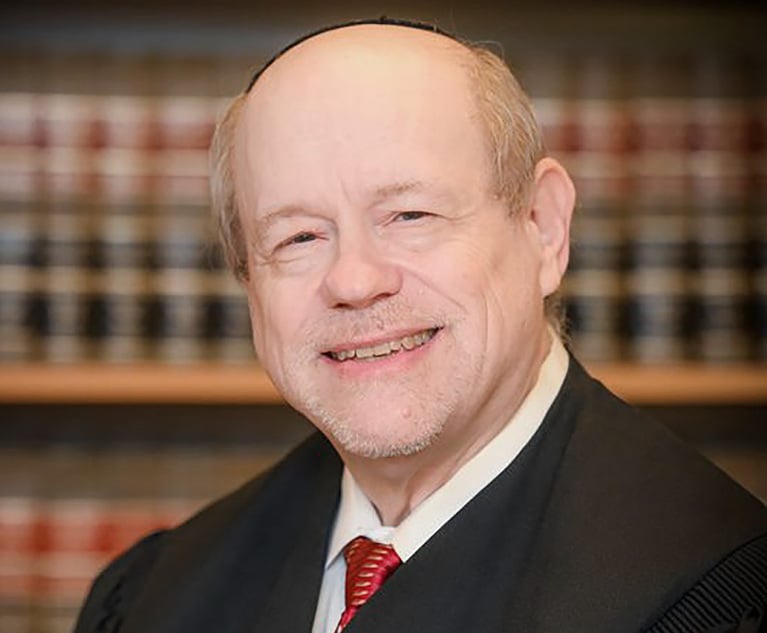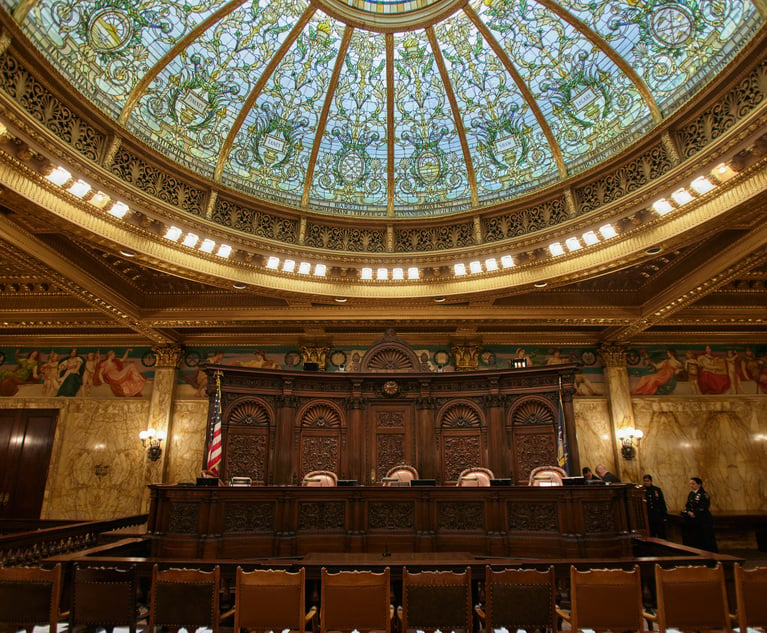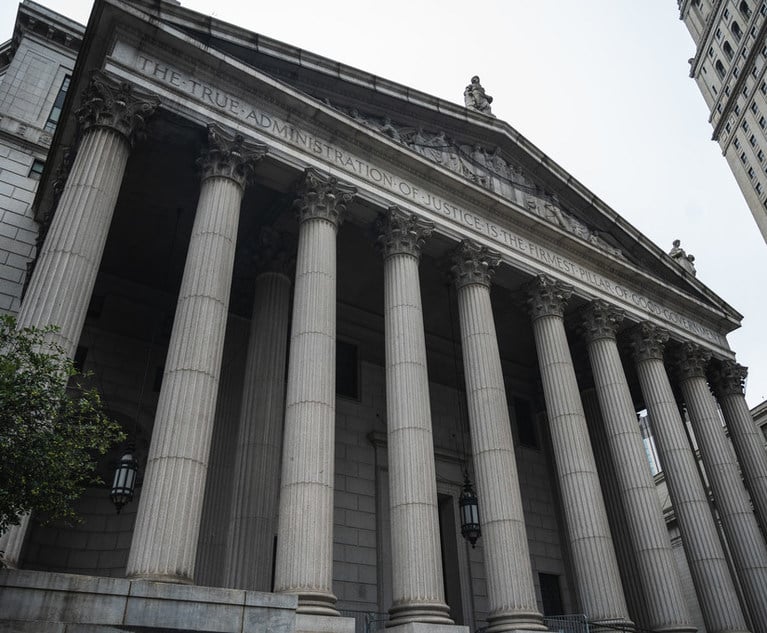Supreme Court Reins In, But Does Not Overturn, SEC's Disgorgement Authority
In a highly anticipated decision, the U.S. Supreme Court on Monday in Liu v. S.E.C. No. 18-1501 (2020), took steps to limit the SEC's aggressive use of disgorgement of ill-gotten gains in litigated cases, but did not, as some had hoped, do away with this powerful remedy in litigated actions entirely.
June 25, 2020 at 01:29 PM
9 minute read
 Barry R. Goldsmith, Frederick R. Yarger and M. Jonathan of Gibson Dunn & Crutcher (Photo: Courtesy Photo)
Barry R. Goldsmith, Frederick R. Yarger and M. Jonathan of Gibson Dunn & Crutcher (Photo: Courtesy Photo)In a highly anticipated decision, the U.S. Supreme Court on Monday in Liu v. S.E.C. No. 18-1501 (2020), took steps to limit the SEC's aggressive use of disgorgement of ill-gotten gains in litigated cases, but did not, as some had hoped, do away with this powerful remedy in litigated actions entirely. Specifically, while leaving lower courts to fill in the precise contours, the Supreme Court articulated three guiding principles for determining the availability and scope of SEC disgorgement: first, disgorgement should benefit "wronged investors" rather than "the public at large"; second, courts may hold parties liable only for their own profits, not others' profits; and third, disgorgement cannot exceed actual gains and must instead be limited to "net profits" after deducting "legitimate expenses."
Since the SEC began obtaining disgorgement over five decades ago, it has become the agency's principal monetary weapon. Indeed, in the most recent fiscal year, the SEC brought in $1.1 billion in penalties but nearly three times that amount—over $3.2 billion—in disgorgement. Despite the new limitations the court imposed in Liu, disgorgement is likely to remain a key weapon in the SEC's arsenal.
Five Decades of SEC Disgorgement
Courts first granted the SEC authority to obtain disgorgement in 1970, as a form of implied equitable relief. See S.E.C. v. Texas Gulf Sulphur, 312 F. Supp. 77, 93 (S.D.N.Y. 1970). In 1990, SEC enforcers received explicit statutory authority to obtain disgorgement in administrative proceedings, see 15 U.S.C. §77h–1(e), but the authority to seek disgorgement in court remained implied as part of the SEC's ability to seek judicial equitable relief, see 15 U.S.C. §78u(d)(5).
To obtain disgorgement, the SEC must show "a reasonable approximation of profits causally connected to the violation." See S.E.C. v. Warde, 151 F.3d 42, 50 (2d Cir. 1998). Once the commission makes this showing, the burden shifts to the target, who faces the often difficult task of disproving the reasonableness of the SEC's calculation. See, e.g., S.E.C. v. Whittemore, 659 F.3d 1, 7 (D.C. Cir. 2011). The target also bears the burden of establishing "legitimate business expenses," which may be deducted from the disgorgement sum, as opposed to expenses paid to support the fraudulent scheme—the proverbial "cost of the getaway car"—which may not. Under this framework, the SEC often has the upper hand—and the numbers prove it. Over the past five years the SEC obtained nearly $14.5 billion in disgorgement, almost three times what it collected in civil penalties.
Those in the SEC's crosshairs have fought back. In 2017, the agency's adversaries landed a major victory when the Supreme Court barred the SEC from its longstanding practice of seeking disgorgement for aged violations, holding that disgorgement is a "penalty" subject to a five-year statute of limitations. See Kokesh v. S.E.C., 137 S. Ct. 1635 (2017). In doing so, the court explicitly clarified that it was not questioning "whether courts possess authority to order disgorgement in SEC enforcement proceedings." But commentators and lower courts nevertheless began speculating whether the Supreme Court might strike down the remedy in litigated actions altogether.
'Liu' Decision
Liu did not go nearly that far, holding that "a disgorgement award that does not exceed a wrongdoer's net profits and is awarded for victims is … permissible under [15 U.S.C.] §78u(d)(5)," the statute authorizing the SEC to seek equitable relief. In preserving the remedy as a general matter, however, the court emphasized its equitable limits, while leaving for future litigation how those limits will play out in practice.
Liu arose from a 2016 enforcement action alleging misappropriation of millions of dollars of investors' funds under the guise of constructing a cancer-treatment center that would have qualified the investors for EB-5 immigration status. The district court agreed with the SEC, ordering, in addition to civil penalties, disgorgement of "all funds received from [the] illegal conduct," which, with prejudgment interest, totaled over $26 million. S.E.C. v. Liu, 262 F. Supp. 3d 957, 975–76 (C.D. Cal. 2017). In calculating disgorgement, the district court did not permit any deduction for business expenses, labeling as "futile" the defendants' argument that the scheme was "at least partially legitimate." The U.S. Court of Appeals for the Ninth Circuit affirmed. See S.E.C. v. Liu, 754 Fed. Appx. 505 (9th Cir. 2018).
In holding that SEC disgorgement, properly cabined, constitutes permissible equitable relief, the Supreme Court examined whether the remedy falls within "those categories of relief that were typically available in equity." Based on this analysis, the court found that "courts have occasionally awarded disgorgement in three main ways that test the bounds of equity practice: by ordering the proceeds of fraud to be deposited in Treasury funds instead of disbursing them to victims, imposing joint-and-several disgorgement liability, and declining to deduct even legitimate expenses from the receipts of fraud." But despite identifying these problems, the court did not specifically explain how to resolve them. Instead, it provided general guidelines for lower courts to consult in evaluating disgorgement awards going forward.
First, the court emphasized that disgorgement must be imposed for the benefit of investors, noting that "the SEC's equitable, profits-based remedy must do more than simply benefit the public at large by virtue of depriving a wrongdoer of ill-gotten gains." In many cases—for example, where there are no apparent investor victims or it is infeasible to distribute the funds to harmed individuals—the SEC deposits disgorged funds with the Treasury. This practice, the court opined, may be suspect: "It is an open question whether, and to what extent, that practice … satisfies the SEC's obligation to award relief 'for the benefit of investors'… ." Whether that practice may continue, however, will be a subject for future litigation.
Next, the court emphasized "the common-law rule requiring individual liability for wrongful profits," while noting that "[t]he historic profits remedy … allows some flexibility to impose collective liability." Thus, while there could potentially be "liability for partners engaged in concerted wrongdoing," like the married petitioners in Liu, joint-and-several liability was "seemingly at odds with the common-law rule."
Finally, the court explained that disgorgement must not exceed a party's ill-gotten gains, and, therefore, "courts must deduct legitimate expenses before ordering disgorgement." The district court in Liu "declined to deduct expenses on the theory that they were incurred for the purposes of furthering an entirely fraudulent scheme." Whether all the expenses were illegitimate, however, could not merely be assumed. On remand, the district court will be required to distinguish legitimate, deductible expenses that "have value independent of fueling a fraudulent scheme"—including, potentially, the lease payments and cancer-treatment equipment in Liu—from 'inequitable deductions' such as for [the alleged fraudsters'] personal services."
Practical Implications of 'Liu'
While Liu will certainly affect SEC enforcement actions going forward, it remains unclear how significantly it will impede the SEC's aggressive use of disgorgement in settled and litigated cases.
In particular, the Supreme Court left open the question of whether, and under what circumstances, the SEC is permitted to deposit disgorged funds into the Treasury where, as is often the case, it is infeasible to distribute funds to injured investors (if any exist). For example, the SEC has leaned on its disgorgement power to obtain large settlements in Foreign Corrupt Practices Act cases where identifying victims or distributing funds would be difficult, if not impossible. In fact, over the last five years, the SEC has returned less than 15% of disgorged funds to harmed investors. The SEC may try to avoid the issue by finding new ways to benefit investors—for example, by depositing disgorgement proceeds into investor protection funds rather than the Treasury—but this issue will be critical in future litigation and settlement negotiations.
Meanwhile, the court's guidance regarding the deductibility of legitimate expenses that "have value independent of fueling a fraudulent scheme" is likely to assist defense counsel in settled and litigated cases, shrinking the "net profits" eligible for disgorgement. It may also lead to more fact-intensive disgorgement inquiries, perhaps requiring expert analyses on both sides.
Even if Liu significantly constrains the SEC's disgorgement authority, the commission could pivot to minimize its impact. First, it is unclear the extent to which Liu's guiding principles apply to SEC disgorgement in administrative proceedings, where there is express statutory authority for the remedy. The SEC may therefore decide to bring more administrative cases and avoid the judicial forum. Additionally, the SEC may increasingly rely on, and aggressively interpret, its statutory authority to pursue civil penalties. As a result, Liu may have the effect of altering the mix (but not the amount) of monetary remedies the SEC seeks.
Regardless, it is clear that Liu, far from defining the outer boundaries of SEC disgorgement authority, has raised significant questions that will only be resolved through additional litigation. The battle over SEC disgorgement powers is far from over.
Barry R. Goldsmith is a partner at Gibson, Dunn & Crutcher and co-chair of the firm's securities enforcement practice group. Goldsmith formerly served as executive vice president for Enforcement of the National Association of Securities Dealers, now FINRA, He also served as chief litigation counsel at the SEC where he was responsible for all enforcement litigation brought by the agency. Frederick R. Yarger is a partner at the firm, where his practice focuses on complex litigation in trial and appellate courts, including cases involving administrative law and regulatory matters. Previously, Yarger served as Solicitor General for the state of Colorado. M. Jonathan Seibald is an associate at the firm.
This content has been archived. It is available through our partners, LexisNexis® and Bloomberg Law.
To view this content, please continue to their sites.
Not a Lexis Subscriber?
Subscribe Now
Not a Bloomberg Law Subscriber?
Subscribe Now
NOT FOR REPRINT
© 2025 ALM Global, LLC, All Rights Reserved. Request academic re-use from www.copyright.com. All other uses, submit a request to [email protected]. For more information visit Asset & Logo Licensing.
You Might Like
View All
Decision of the Day: Judge Sanctions Attorney for 'Frivolously' Claiming All Nine Personal Injury Categories in Motor Vehicle Case


Decision of the Day: Trial Court's Sidestep of 'Batson' Deprived Defendant of Challenge to Jury Discrimination

Decision of the Day: Commercial Division Finds Defendant Engaged in Unfair Competition Against Plaintiff
Law Firms Mentioned
Trending Stories
- 1Eight Years On, A&O Shearman’s Fuse Legal Tech Incubator is Still Evolving
- 2Google Makes Appeal to Overturn Jury Verdict Branding the Play Store as an Illegal Monopoly
- 3First Amendment Litigator Returns to Gibson Dunn
- 4In Record Year for Baker Botts, Revenue Up 11.8%, PEP Up 17.6%
- 5Loopholes, DNA Collection and Tech: Does Your Consent as a User of a Genealogy Website Override Another Person’s Fourth Amendment Right?
Who Got The Work
J. Brugh Lower of Gibbons has entered an appearance for industrial equipment supplier Devco Corporation in a pending trademark infringement lawsuit. The suit, accusing the defendant of selling knock-off Graco products, was filed Dec. 18 in New Jersey District Court by Rivkin Radler on behalf of Graco Inc. and Graco Minnesota. The case, assigned to U.S. District Judge Zahid N. Quraishi, is 3:24-cv-11294, Graco Inc. et al v. Devco Corporation.
Who Got The Work
Rebecca Maller-Stein and Kent A. Yalowitz of Arnold & Porter Kaye Scholer have entered their appearances for Hanaco Venture Capital and its executives, Lior Prosor and David Frankel, in a pending securities lawsuit. The action, filed on Dec. 24 in New York Southern District Court by Zell, Aron & Co. on behalf of Goldeneye Advisors, accuses the defendants of negligently and fraudulently managing the plaintiff's $1 million investment. The case, assigned to U.S. District Judge Vernon S. Broderick, is 1:24-cv-09918, Goldeneye Advisors, LLC v. Hanaco Venture Capital, Ltd. et al.
Who Got The Work
Attorneys from A&O Shearman has stepped in as defense counsel for Toronto-Dominion Bank and other defendants in a pending securities class action. The suit, filed Dec. 11 in New York Southern District Court by Bleichmar Fonti & Auld, accuses the defendants of concealing the bank's 'pervasive' deficiencies in regards to its compliance with the Bank Secrecy Act and the quality of its anti-money laundering controls. The case, assigned to U.S. District Judge Arun Subramanian, is 1:24-cv-09445, Gonzalez v. The Toronto-Dominion Bank et al.
Who Got The Work
Crown Castle International, a Pennsylvania company providing shared communications infrastructure, has turned to Luke D. Wolf of Gordon Rees Scully Mansukhani to fend off a pending breach-of-contract lawsuit. The court action, filed Nov. 25 in Michigan Eastern District Court by Hooper Hathaway PC on behalf of The Town Residences LLC, accuses Crown Castle of failing to transfer approximately $30,000 in utility payments from T-Mobile in breach of a roof-top lease and assignment agreement. The case, assigned to U.S. District Judge Susan K. Declercq, is 2:24-cv-13131, The Town Residences LLC v. T-Mobile US, Inc. et al.
Who Got The Work
Wilfred P. Coronato and Daniel M. Schwartz of McCarter & English have stepped in as defense counsel to Electrolux Home Products Inc. in a pending product liability lawsuit. The court action, filed Nov. 26 in New York Eastern District Court by Poulos Lopiccolo PC and Nagel Rice LLP on behalf of David Stern, alleges that the defendant's refrigerators’ drawers and shelving repeatedly break and fall apart within months after purchase. The case, assigned to U.S. District Judge Joan M. Azrack, is 2:24-cv-08204, Stern v. Electrolux Home Products, Inc.
Featured Firms
Law Offices of Gary Martin Hays & Associates, P.C.
(470) 294-1674
Law Offices of Mark E. Salomone
(857) 444-6468
Smith & Hassler
(713) 739-1250






